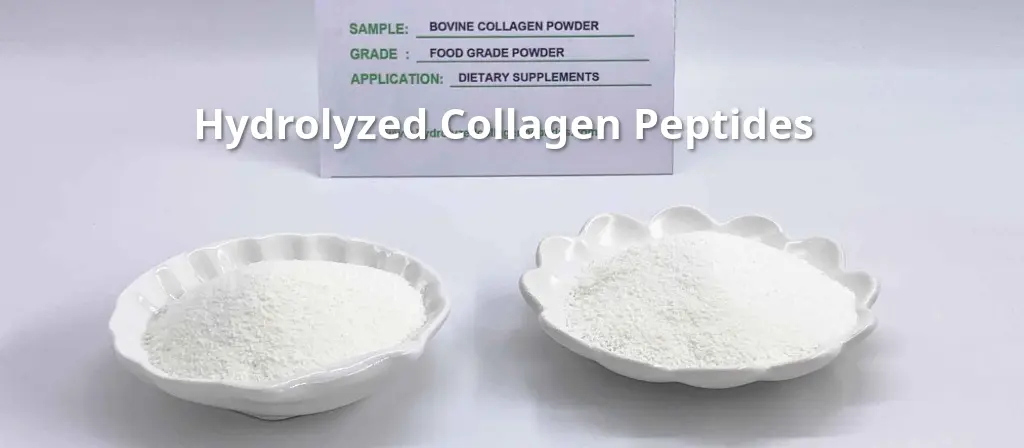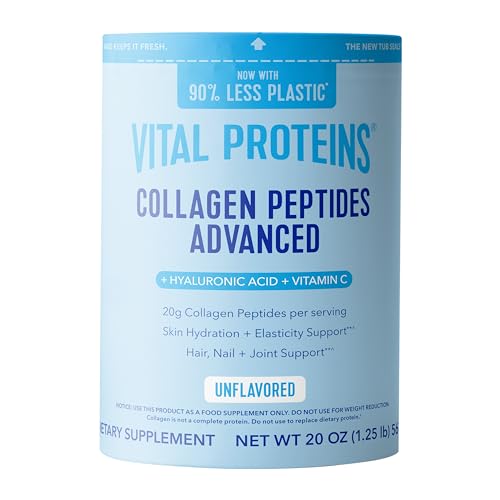If you're looking to slow down the aging process, you've likely come across collagen supplements as a potential solution. Specifically, hydrolyzed bovine collagen peptides have gained attention for their promising effects on skin elasticity, joint health, and hair strength. But how effective are they really? Let's dive into the science behind collagen and collagen peptides, exploring whether they can truly support your anti-aging journey. Drawing from credible sources and research, this article breaks down the benefits and considerations of incorporating this nutraceutical into your routine.
Collagen and Collagen Peptides: The Building Blocks of Youth
Collagen is a vital protein in our bodies, making up a significant portion of our skin, bones, and connective tissues. As we age, natural collagen production declines, leading to visible signs like sagging skin and stiff joints. This is where collagen peptides come in. These are smaller, broken-down forms of collagen, often sourced from bovine hides, that are easier for the body to absorb. According to Healthline, hydrolyzed bovine collagen peptides are rich in specific amino acids that play a key role in rebuilding and maintaining the body's structural integrity. Let's explore how these peptides can target specific aging concerns.
Skin Elasticity and Collagen Peptides: A Dermatology Perspective
One of the most sought-after benefits of collagen peptides is their potential to improve skin elasticity. The loss of firmness in our skin is often tied to diminishing collagen levels over time. Research highlighted in a study on PMC suggests that regular intake of hydrolyzed collagen can increase skin hydration and elasticity, helping to reduce the appearance of fine lines. From a dermatology standpoint, this makes sense because collagen peptides provide the raw materials, like specific amino acids, needed to support skin repair and resilience. If you're aiming to maintain a youthful glow, this could be a valuable addition to your anti-aging product lineup.
Vital Proteins Collagen Peptides Powder Advanced with Hyaluronic Acid & Vitamin C, 20oz Collagen Protein, Unflavored, 27 Servings
SUPPORTS COLLAGEN PRODUCTION: With 100% daily value of Vitamin C, this Vital Proteins Collagen Peptides Advanced Powder helps promote collagen production which is important for maintaining healthy skin
SUPPLE SKIN HYDRATION: Contains 120mg Hyaluronic Acid to support skin hydration and collagen for skin elasticity
HIGHLY BIOAVAILABLE: Derived from grass-fed, pasture-raised bovine, our hydrolyzed collagen peptides are easily digested and absorbed by the body
VERSATILE AND EASY TO USE: Dissolve one serving of Vital Proteins collagen daily in hot or cold beverages like coffee, tea, or smoothies for a convenient collagen boost
QUALITY INGREDIENTS: Paleo Friendly and Whole30 Approved, our collagen supplements are made without dairy and gluten
View on AmazonSupporting Joint Mobilization: Easing Age-Related Discomfort
As we get older, joint stiffness can become a daily frustration, impacting mobility and quality of life. Collagen peptides may offer relief by supporting joint mobilization. The amino acids proline and hydroxyproline, found abundantly in bovine collagen, are essential for maintaining cartilage health. Healthline notes that studies have shown collagen supplementation can reduce joint pain, particularly in individuals with osteoarthritis. For those seeking to stay active as they age, incorporating this nutritional supplement into a wellness routine might help keep joints moving more comfortably.
Human Hair Growth: Can Collagen Make a Difference?
Thinning hair is another common concern as we age, and collagen peptides might play a supportive role in promoting human hair growth. While direct evidence is still emerging, the amino acid glycine, a component of collagen, is crucial for building keratin, the primary protein in hair. A discussion on BBC Future points out that while collagen won't magically reverse hair loss, it may strengthen hair strands by providing essential building blocks. If you're noticing weaker or brittle hair, pairing collagen with a balanced diet could be a step toward healthier locks.
The Biochemistry Behind Collagen: Why Amino Acids Matter
To fully appreciate how collagen peptides work, it's worth touching on the biochemistry involved. Collagen is composed of unique amino acids like proline, glycine, and hydroxyproline, which are critical for forming the triple-helix structure of collagen fibers. These components not only support skin and joint health but also play a role in cellular repair processes. Some researchers even speculate that supporting collagen production could indirectly influence mechanisms like telomere protection, which are linked to cellular aging. While the science is complex, the takeaway is simple: collagen peptides provide the body with targeted nutrients to combat age-related decline.
Are Collagen Peptides the Key to Slowing Aging?
Hydrolyzed bovine collagen peptides show promising potential for those looking to slow the aging process. From enhancing skin elasticity and supporting joint mobilization to possibly aiding human hair growth, the benefits are backed by emerging research and insights from sources like Healthline, PMC, and BBC Future. While they aren't a cure-all, integrating this nutraceutical as part of a broader anti-aging strategy could offer tangible improvements. Remember to consult with a healthcare professional before starting any nutritional supplement, and focus on a holistic approach that includes diet and lifestyle. Have you tried collagen peptides? Share your experiences, and let's keep the conversation about aging gracefully going!

